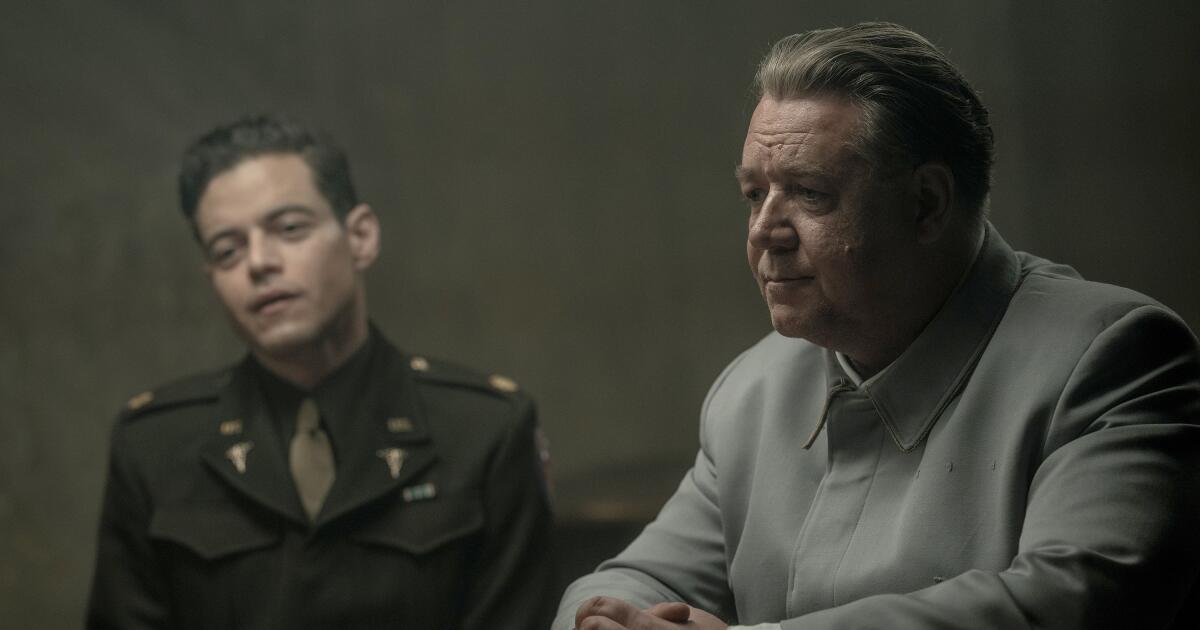
Films about war criminals facing justice are consistently valuable and important. They offer both insight and emotional release, almost like a public service. James Vanderbilt’s “Nuremberg,” which depicts the trial of Nazi leaders after World War II, fits this mold. While not perfect, the film is a well-meaning and informative drama.
In his second time directing, writer Neil Vanderbilt – known for his work on the screenplay for David Fincher’s “Zodiac” – brings Jack El-Hai’s book “The Nazi and the Psychiatrist” to the screen. The film explores the unusual therapeutic relationship between Dr. Douglas Kelley, an American Army psychiatrist, and Hermann Göring, a high-ranking Nazi official, as the Nuremberg trials approached.
The movie centers around two strong performances from Academy Award winners: Russell Crowe plays the imposing Hermann Göring, and Rami Malek portrays the anxious Captain Kelley. Near the end of World War II, Kelley is sent to a temporary prison in Luxembourg to assess high-ranking Nazi officials. He quickly becomes fascinated by the opportunity to observe so many different kinds of self-centered personalities.
It soon becomes apparent that the doctor is pursuing his own agenda with this unusual assignment. In a rather obvious moment of storytelling, he muses that the events could be the subject of a book, and immediately heads to the library with his young interpreter, Howie (Leo Woodall), in tow. That book, eventually published in 1947 as “22 Cells in Nuremberg,” served as a cautionary tale about the potential for Nazism to take root in America, but the warning went largely unheeded – people didn’t want to believe their neighbors could be capable of such ideology until it was too late.
Something I really took away from learning about the Nuremberg trials, and especially after watching the film about them, is that the Nazis weren’t just monsters. They were people – and that’s the truly terrifying part. It really drove home the point that human beings are capable of incredible horrors. I remember the film purposefully stopping at a key moment to show actual footage from the concentration camps, and it was devastating. It wasn’t some otherworldly evil that created the Final Solution, but ordinary people making terrible choices.

Movies
This fall promises exciting new films, including a Bruce Springsteen biopic, an adaptation of Stephen King’s “The Running Man,” and the highly anticipated sequel to “Wicked.” Here’s a look at what’s coming to theaters.
However, people aren’t powerless – they can choose to defend the rule of law and ensure it’s respected. This is exemplified by Justice Robert Jackson (played by Michael Shannon), who, despite facing immense practical and legal challenges, was determined to pursue justice, as seen in the beginning of the Nuremberg trials.
Kelley’s reasons aren’t purely selfless. He’s deeply intrigued by these men and their psychological issues, especially the deceptively charming Göring. Driven by his scientific curiosity, the doctor becomes too involved with his patient, ultimately acting as a messenger between Göring and his family, who were still in hiding. Kelley discovers that Göring, despite being a megalomaniac, arrogant, and manipulative, is still fundamentally human. This realization makes the horrors of the genocide he helped create even more disturbing.
Let me tell you, Russell Crowe absolutely dominates the screen – he brings such presence to his portrayal of Göring, and Brendan Gleeson matches him beat for beat. The scene where they finally face off in court is just electrifying – a truly gripping piece of drama. Rami Malek, meanwhile, plays a wonderfully erratic and unpredictable character. While his energy is fascinating alongside Crowe’s, their dynamic feels a little uneven overall.
Vanderbilt aims for a classic, old-fashioned feel in “Nuremberg,” but it doesn’t always quite work. John Slattery, playing the prison colonel, delivers lines reminiscent of 1940s films, but the movie’s color scheme is a drab, washed-out gray. While this was a deliberate choice to make the film look like an old, faded photograph, the result is unfortunately quite unattractive.
As a film buff, I found this movie a bit uneven. The director seemed unsure of what story they wanted to tell, and it felt like they threw in too much, which unfortunately hurt the overall impact. What really worked, though, was Howie’s backstory – it’s based on a true story, and the actor playing him absolutely nailed the emotional weight of it. But honestly, the female characters felt really shortchanged. There’s this journalist who basically uses flirtation to get information, and the judge’s clerk who just… comments on everything. They barely get mentioned, and it felt like they were just there to give the male characters someone to talk to. It was frustrating, to be honest, because they deserved so much more.
Although the story behind “Nuremberg” makes it worth seeing, the movie is uneven. While Russell Crowe and Michael Shannon deliver strong performances, others fall flat. The film eventually gets its point across, but it feels delayed and less impactful now, even though the themes remain important. If the film was meant to be a warning, that warning has lost its urgency.
Walsh is a Tribune News Service film critic.
Read More
- Clash Royale Best Boss Bandit Champion decks
- Vampire’s Fall 2 redeem codes and how to use them (June 2025)
- Mobile Legends January 2026 Leaks: Upcoming new skins, heroes, events and more
- World Eternal Online promo codes and how to use them (September 2025)
- Clash Royale Season 79 “Fire and Ice” January 2026 Update and Balance Changes
- Best Arena 9 Decks in Clast Royale
- M7 Pass Event Guide: All you need to know
- Clash Royale Furnace Evolution best decks guide
- Best Hero Card Decks in Clash Royale
- Clash Royale Witch Evolution best decks guide
2025-11-07 05:01